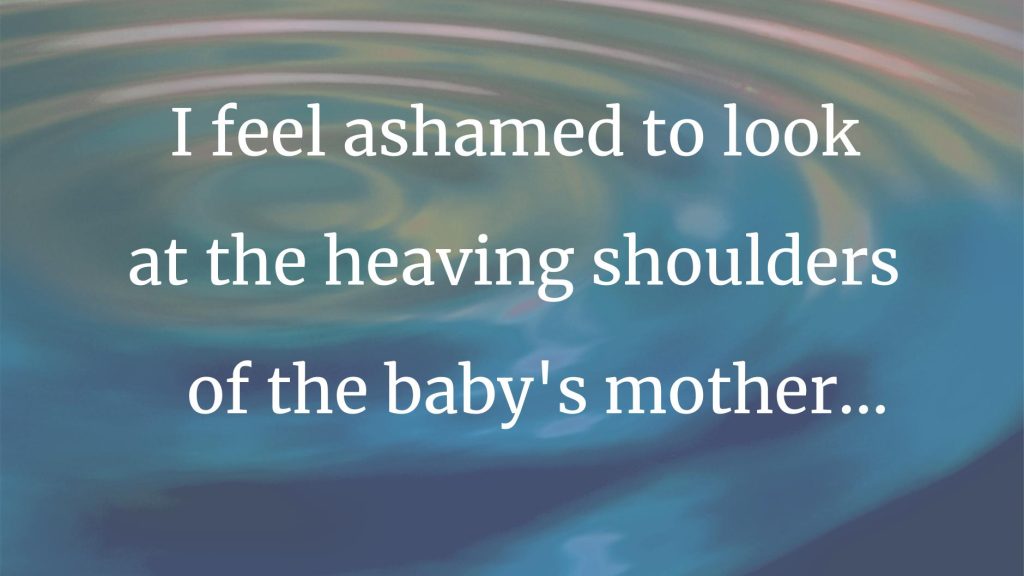Babies are not made of plastic.
In both their distribution of mass and their texture, the feel is utterly different. Babies are warm and soft and plump and pink. Their heads are bowling balls.
New mothers are uncomfortably aware of this fact, as I’ve observed many times in my role as a pediatrician. They stoop, then slither their hands under their baby’s necks and gingerly cradle them to their chests. They are all awkward elbow angles, propping their babies up on nervous, bouncing knees, offering fastidious back-pats.
This reality is what I try to recall when I go in for my yearly CPR recertification and am pounding on the chest of a plastic mannequin. Mannequins have a rubbery outer covering that’s rigid and cold; it’s buttoned over a spring-loaded sternum that recoils when you remove your hands. If you try hard enough, you can press a mannequin’s chest all the way down to the particleboard table.
The mannequin lives in the ungroomed corner of a nameless nursing-administration office and is plugged into a laptop that offers robotic feedback like “Press faster”—and then, inevitably, “Press slower.” Sometimes the mannequin shifts on the table, and you have to reposition it; otherwise, the computer will chirp, “Error.”
I’m supposed to suspend my disbelief when I practice on the simulation dolls. I’m supposed to pretend that I’m stressed out, and that this doll was once alive and breathing and cooing and is now dead and stiff and cold as plastic.
I can never manage it.
Because in the simulation, unlike the present moment, I’m not teetering on the edge of a metal stool, my own heart thrumming in my ears, sweat pooling under my arms, wisps of hair plastered to my forehead, pressing my body weight into my aching thumbs. In the simulation, I don’t see the respiratory therapist’s blue-veined, bony hands clenching a clear plastic mask against a pair of pliable cheeks and squeezing oxygen out of a green balloon. There isn’t a red cap popping off a syringe head as the nurse calls out, “Code epi, number seven, delivered.” There is no intensivist with tired eyes, threading a needle under the right clavicle, the smell of blood reaching my nostrils before I see the red flood pouring over her shaking fingers.
Babies are not made of plastic.
Even when they turn purple, then grey, then white; even when they are limp and cold, they are soft and plump. They roll under your hands.
Even once they are dead, there is no mechanical voice saying: “Error.”
And yet here I am, working on a real baby, but picturing that ridiculous mannequin, and mouthing the words “Stayin’ alive, stayin’ alive….”
When my relief person steps in, I step back. I shed my jacket, and I feel ashamed to look at the heaving shoulders of the baby’s mother in a pair of stained pajama pants and a lemon-yellow crewneck sweatshirt that reads “Myrtle Beach” in flowery cursive. She is turned away, into the crook of her husband’s arm; he has oily smudges on his nighttime glasses, and he stares at the monitor with red-rimmed eyes. He knows it’s over.
I can’t feel anything, so I try to pray, but my head is all buzzing electric noise, and I can’t focus.
I return upstairs, passing by the dark rooms and closed doors of my sleeping patients. Doors keep them safe from the fragrance of finality that seeps off my scrubs.
My phone rings, and the same physician who called the time of death tells me about three new hospital admissions, now that he’s caught up with the rest of the patients in the emergency-department waiting room.
I see the new patients and their families, and I talk to their yawning faces about nasal cannulas and Tylenol and say, “If you have any questions, the nurses know where to find me.”
I finally have a moment to park at my desk, and I sip Coke Zero and shovel kettle chips into my mouth, then wipe the grease onto my pants and enter notes into the computer.
In the morning, my body drives home, but my mind is disconnected, and I almost run a red light. At home, I crank the temperature down to sixty-eight degrees. I curl up under my comforter.
I’m fine. And I hate that.
I replay the way that baby felt in my hands. The texture, the distribution of mass. The only thoughts I can muster are: Did I compress deep enough? Fast enough? Were my hands in the right place? I think about it clinically, as we’re trained to do.
I sit up and say aloud, “Babies are not made of plastic.”
And still I feel nothing, so I force myself to think about Myrtle Beach and Mom’s hands clutching her husband like driftwood, Mom’s hands that will never clean up all the baby-bottom bathing-suit sand that will never track into the rental unit, and I force myself to feel the lump expanding in my throat, the sting of salt at the corner of my eyes, and I sob into the mattress, a mixture of guilt and grief.
Relief.
Babies are not made of plastic.
Turns out, neither am I.








5 thoughts on “Myrtle Beach”
Deeply moving and beautifully written. Thank you for your honesty and openness in sharing this.
What a stunning yet sad essay! What you endured is horrific, but it connected you with your soul—and that is beautiful. I wish that all physicians realized that neither they nor their patients are plastic.
Thank you for your bravery sharing your humanity.
You’ve borne a beautiful, painful witness to this baby’s life and death, and the devastating grief of the family.
Thank you for this.
This is so beautifully written, bringing tears to my eyes. You have captured the excruciating pain and grief of losing a child, that of both the parents and yours, the clinician. Your words accurately reflect the helplessness and horror of this shared experience. Thank you for this.